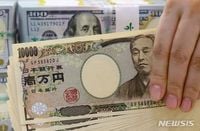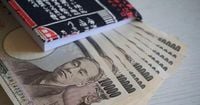On May 7, 2025, the Japanese Yen (JPY) exchange rate saw a notable rise against the South Korean Won (KRW), with Hana Bank reporting an exchange rate of 974.81 KRW per 100 Yen. This marked an increase of 9.42 KRW from the previous day, representing a rise of 0.98%. Throughout the trading day, the Yen's value fluctuated, temporarily dipping to 951.11 KRW before rebounding to a high of 995.92 KRW.
The increase in the Yen's value is attributed to heightened volatility in the financial markets and a growing demand for the Yen against the Won. Analysts suggest that the recent surge in exchange rates is also influenced by investor expectations of potential profits from currency trading. A graph illustrating the exchange rate movement shows a stable trend until the afternoon of May 6, followed by a sharp increase after dawn on May 7.
Factors contributing to the Yen's rise include international oil prices, U.S. interest rates, and various economic indicators from Japan. Experts have highlighted the importance of risk management in light of these short-term fluctuations in the exchange rate, suggesting that future changes in interest rate differentials between Japan and Korea will play a crucial role in determining the Yen's trajectory.
On the same day, the USD/JPY exchange rate experienced slight declines earlier in the day but attracted renewed buying interest, continuing its upward trend against the U.S. dollar for the third consecutive trading day. The bullish momentum of the Yen is supported by several factors, including the Bank of Japan's (BoJ) dovish stance announced last week. Market analysts now anticipate that the BoJ may increase interest rates one more time in 2025.
Investor sentiment has shifted towards the Yen as a safe haven asset, driven by concerns regarding former President Donald Trump's unpredictable trade policies and ongoing geopolitical tensions. As the market gears up for the upcoming Federal Reserve's (Fed) Federal Open Market Committee (FOMC) meeting, the U.S. dollar is under downward pressure, further contributing to the Yen's strength.
In Vietnam, the buying and selling rates for the Japanese Yen at various banks have also seen slight declines. The current exchange rates at the National Bank's transaction points range from 164 VND to 182 VND. Specific rates include ABBank's purchase at 174.87 VND and sale at 184.84 VND, while ACB offers a purchase rate of 177.31 VND and a sale rate of 184.99 VND. Other banks, such as Agribank and BIDV, have similar buying and selling rates, indicating a consistent trend across financial institutions.
As the exchange market continues to react to global economic conditions, analysts emphasize the need for investors to remain vigilant. They point out that the interplay between domestic economic policies and external market pressures will be crucial in shaping the future of the Yen's value. The upcoming decisions from both the Bank of Japan and the Federal Reserve will likely have significant implications for exchange rates, making it an essential period for currency traders.
In summary, the Japanese Yen's performance on May 7, 2025, reflects a complex interplay of market dynamics, investor sentiment, and broader economic indicators. As the financial landscape evolves, stakeholders will need to adapt to the shifting tides of currency valuation.


